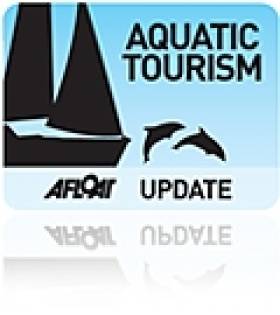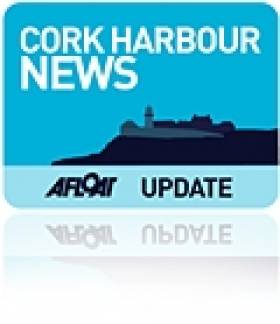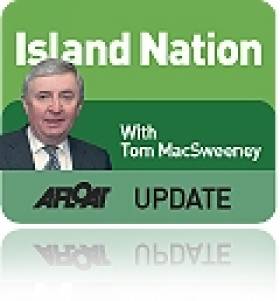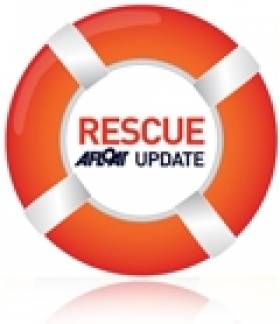Displaying items by tag: west cork
Seaweed Experience in West Cork
Seaweed picking is just one example of many 'green' tourism breaks now available in Ireland, according to The Irish Times.
Inchydoney Island Lodge and Spa in West Cork offers a two-night 'seaweed experience' for those looking for a more responsible, activity-based weekend away.
Aside from the typical spa treatments such as seaweed baths, local experts will take visitors seaweed foraging by kayak, while also educating about the area's natural beauty and abundant marine life.
Seaweed was once a staple of the Irish diet, and this break aims at a revival of the versatile superfood by showing how it can be used in a variety of dishes.
The Irish Times has more on the story HERE.
1720 European Championships to be Launched on the Lee
The 1720 Sportsboat European Championships and the class national championships will be launched at a "Sailing By The Lee" event on Friday 29th April, 2011 where six 1720's will be raced on the River Lee adjacent to the Headquarters of the Port of Cork. The boats will be brought up river on the Thursday evening and racing will commence at lunch time on the Friday (see below for the Eddie English weather video) which say the class will provide photo and media opportunities at the new marina in the Port of Cork. Each boat will carry sponsorship flags.
In June up to 20 boats go back to their roots when the fleet gathers at Royal Cork Yacht Club for the CH Marine Sponsored National Championships.
A fleet of between 30-35 boats will contest the Corona sponsored Europeans when they set sail off Baltimore in September. There are already confirmed entries travelling from Scotland, Isle of Man, England and Wales while there is also interest coming from Holland where a fleet of eight boats is currently active.
The robust Irish 1720 design has been celebrating a comeback in recent years after cheating death by atrracting a strong following in West Cork, spearheaded by some of the rebel county's top sailors.
The fleet is rapidly becoming the most popular one design keel boat in this part of Ireland. There are now established and growing fleets at Royal Cork, Crosshaven, Kinsale, Baltimore and Schull while Galway Bay also has a growing fleet, racing in Galway Bay. The 2010 Nationals attracted a fleet of over twenty boats,
The series itself will be sailed over a three day period starting on Thursday, 1st September and consisting of nine races in total, three per day. Notice of Race and Entry Forms will be available shortly from Baltimore Sailing Club.
Impressive Views from Dublin and Cork Waterfront Properties
This semi detached holiday home is situated on an elevated site with uninterrupted harbour views just a five minute scenic walk to the village.
Baltimore is a renowned sailing centre with its three sailing schools and two diving centres. Regular ferry trips will take you to the nearby islands of Cape Clear and Sherkin with its lovely sandy beaches.
Vaulted ceilings to dining area, Oak timber beams, open fireplace, teak stairs, paved patio areas are some of the attractive features of this property.
The asking price is €465,000. All the details plus lovely photos here.
The second property to catch our eye while wandering round Howth head in the past fortnight is a detached dormer bungalow, with spectacular uninterrupted sea-views over Dublin Bay. The property is tucked away in a secluded and very private location beside Howth Summit for €650,000. Great views here.
Sailing School Navigates Beyond the Gloom
The Principal John Moore has discounted all prices by 20 to 30%. All 2009 sailors returned in 2010 and brought friends with them. The French network of the newly appointed Director of Sailing Hugues Traonmilin has brought French families to the island and the French sailors were mixed with the Irish and British children and adults with great success. In addition to a busy summer season, 60 students of a South East College came for the very first time to the Sailing School in March 2010 as part of the Transition Year programme. They were hosted with full board accommodation at the Sailing School Guest house.
Definitely the location of the Sailing School plays a big part in this success story. Heir Island is located in the middle of Roaring Water Bay half way between Schull and Baltimore. Whatever direction you sail from the Sailing School beach, you'll encounter wonderful maritime landscapes and crystal clear waters. The Topaz dinghy fleet may sail to 3 or 4 different sandy beaches on one sailing day. The 3 Dublin Bay Mermaids sailing in flotilla explore the surrounding islands of Castle Island, Sherkin Island, the 3 Calves Islands and of course the Carthy's Islands to visit the seals colony.
Such a fantastic location has orientated the programme of this Sailing School towards the "Adventure" courses of the Irish Sailing Association. The school offers Adventure 1 & 2 courses as their "speciality" course.
2011 perspectives are already very encouraging with a second college to be hosted in Spring for a 10 day transition programme meanwhile the first one is returning after excellent feedback of the 2010 students and teachers. Being a family run business makes this small company very flexible and the range of their activities covers young sailors from 8 years old to adults, groups and families, on dinghies or on a traditional Heir Island Lobster Boat, and on kayaks if you don't want to sail. Also as a qualified Yachtmaster Instructor, the director of sailing has facilitated individually tailored sail training for yacht owners aboard their own yacht, an option that has proven both practical and successful.
More information HERE.
Preparations Underway for Team Racing Worlds
With the advent of 2011, preparations are now well under way for the holding of the ISAF World Team Racing Championships at Schull from August 27th, 2011 to September 23rd, 2011 writes Claire Bateman. It is a major triumph for the village of Schull, Co. Cork to host the World Championships. The organising committee on behalf of the Fastnet Marine and Outdoor Education Centre (FMOEC) was set up in 1997 and is an adjunct of Schull Community College and the facilities function under the auspices of the Cork County Educational Committee. As Schull is a village community this event will be seen as a community undertaking and the Schull Development Association will be a co-operating organising authority.
The event will be sailed in TR3.6 dinghies which are not too dissimilar to a firefly and 26 boats will be built locally at a cost of €5000.00 each. The hulls will be manufactured in Midleton and the sails will be built by the local sailmaker, Fastnet Sails, in West Cork. So far twelve boats have been sponsored. One of these has been sponsored by Schull Harbour Sailing Club where members have come up with a novel idea to sponsor a second boat. This is a one hundred club where members and their friends each contribute €50.00 towards the project.
Team Racing is a very popular branch of sailing where everything happens very quickly and there is no better school for tactical decision making and understanding of the rules with six boats at a time performing an intricate and aggressive dance where two teams of three race to try and achieve a winning combination of places – with the lowest score winning.
ISAF wish to invite 28 teams to participate at the event in August with teams coning from as far away as Australia, New Zealand and the U.S. with the host country having three teams. Teams are also expected from Italy, Japan, Poland, the U.K. France and Croatia.
Further information or queries regarding sponsorship for this exciting World Championship can obtained from Mr. Tim O'Connor, Principal, Schull Community College at [email protected] or Mr. David Harte, Manager, FMOEC at [email protected].
Schull is a unique part of Ireland for sailing and socialising. The scenery is breath taking, the sailing waters are magnificent, the reputation for organisation of major events is second to none and all our good wishes for the successful running of this major undertaking are with the organisers.
Concern for Small Fishing Boat
Two men in a small dinghy had earlier put to sea in poor weather conditions on Wednesday 29 December. Visibility was restricted due to sea fog. When the dinghy did not return the Coast Guard were alerted. At 17:20, both the Baltimore lifeboat and the Castletownbere lifeboat were requested to provide support.
Coxswain Kieran Cotter was proceeding to Dunmanus Bay on the Tyne class all-weather lifeboat Hilda Jarrett, when the Coast Guard indicated that the two men had been observed coming ashore safe and well. The search and rescue operation was stood down.
This incident echoes a similar one earlier this year. On the 5th January 2010 almost certain tragedy was averted when the inshore lifeboat rescued two men in a 7ft dinghy, which was drifting out to open sea when their outboard failed.
Lifeboat crew on this service ; Kieran Cotter, Micheal Cottrell, Ronnie Carty, Brian McSweeney, Diarmuid Collins.
Related Safety posts
RNLI Lifeboats in Ireland
Safety News
Rescue News from RNLI Lifeboats in Ireland
Coast Guard News from Ireland
Water Safety News from Ireland
Marine Casualty Investigation Board News
Marine Warnings
Naval Sailor Dies in Accident in Schull
Gardai are treating the death of the 34-year-old who fell in to the sea at Schull as an accident. The Irish Times has more on the tragic accident HERE.
Spinnaker on Top in Team Racing National Championships
Last weekend's The Irish Team Racing Association National Team Racing Championships attracted it's largest entry for many years, with 21 teams registered.
The event was hosted by the Fastnet Marine and Outdoor Education Centre in Schull, West Cork.
Four teams travelled over from the UK, and 6 under 19 teams, all from County Cork, competed. They joined the keenest of the post-college teams and the leading university teams to constitute the largest Championships that Ireland has seen for many years. Schull, the venue for next year's World Championship, was a major attraction, but the change of date, from March to November, has made it easier for college students and school pupils to attend.

Weekend Team Racing action from Schull. More photos HERE. Photos: Brian Carlin
The weather forecasts had been predicting storms, floods and general mayhem for days if not weeks beforehand. But Saturday dawned to reveal Schull Harbour in an unusual state – the wind had disappeared! Racing started 3 hours later than planned. However, by the end of the day the first round had been completed. This was a seeded round robin, with each of the four League made up of a UK team, a leading Irish team, a leading college team and two others, including the youth teams.
The results of the first round determined entry into the second round – all the UK teams won all four leagues, with the George Knights, the George Gladiators, Supertroopers and UCD finishing second. These teams were joined in the Gold Leagues of the second round by the winners of play-offs between third place teams. The Bumsby Babes, a youth team from Royal Cork YC, had done well to win 2 races to qualify for a play-off against University of Limerick and they were in a strong position when equipment failure meant that one of their boats retired . In the subsequent re-sail UL managed to win the race and qualify.
On Sunday morning Schull was looking it's best in bright but cold sunshine. Unfortunately, the beauties of the West Cork landscape were exactly mirrored in the unruffled water of the harbour! Competitors, who had made a remarkable effort to arrive on time for an 0900 start, barely recovered from the reception organised the previous evening by the World Championship Committee, waited. When racing eventually got underway, in a fitful breeze, it quickly became obvious that there was no possibility of finishing the second round. Plan B was implemented, a knockout round between the four winners of Round One to determine the outright winner, another between the 4 Irish team placed second in the Round One Leagues to determine the ISA medal places and a Youth round.
GP14 World Champion Ian Dobson in Schull
Spinnaker came through the semis and final to win overall first place. The two Royal St George teams qualified for the final. Last year's winners, the Gladiators won the first race only after finishing places were confirmed by a redress hearing. However, the more experienced Knights went on to win the next to races to reclaim the trophy they had "lent" to the Gladiators last year. The third place play-off, which saw some of the noisiest races of the weekend, resulted in a win by Supertroopers over UCD.
In the Youth event Schull A beat Schull B to win the opportunity to take on, and eventually defeat the Bumsby Babes.
Next year's Championship will be sailed out of the Royal St. George on 12-13 November. However the next challenge for Irish team racers will be qualification for the World Championship, with selection trials planned for both the Youth and Open categories early in 2011.
The event was also the first opportunity to try the new TR3.6 which will be used for the Team Racing Worlds. Video below of the new TR3.6 and voice over from Team Racing World organiser David Harte in Schull. Stills by Brian Carlin HERE.
David Harte Sets Another Headline
I have long admired the commitment and dedication to sailing of David Harte in Schull. With his design of the TR 3.6 he has achieved what may well prove to be the ideal boat for team racing. This aspect of sailing is proving very popular amongst younger sailors. In the past few months I have been watching and reporting on the development of the sport by Match Racing Ireland which is now an integral part of the Irish Sailing Association. There is an excitement and enthusiasm which is good for the sport.
Now Schull and David Harte are adding a new dimension with the TR 3.6 which seems a bit like a Firefly when you look at it first, but then there are clear differences in design. The 3.6, a two-person dinghy, is just that in length. "It is robust, cheap to produce and the first boat customised for team racing. This is a boat for people who don't own a boat. It is a boat made for a situation where different crews will be using it and it has to be able to stand up to that pressure. I looked at the concept of the Firefly and then adapted it to what will prove to be a good boat for team racing," David told me.
The boat was shown for the first time at the announcement that Schull will host the ISAF Team Racing World Championships which will be held in the West Cork harbour in 2011. Twenty-four teams from around the world will compete, with the Fastnet Outdoor Education Centre as the base. It has a proven record of success in teaching sailing as a curricular subject at the adjacent Schull Community College which, through the foresight of the Cork County Vocational Education Committee, established this approach several years ago.
David Harte manages the operation. The success of the Schull students in winning the British championships this year, as well as their progress in the sport elsewhere after they leave the college is a testimony to his success.
Next weekend the Irish Team Racing Championships will be held in Schull, with 18 teams from around the country competing "and 40 per cent of the helms will come from Schull," David told me with a satisfied smile, which he deserves to have.
It is intended to raise funding for a fleet of 25 new TR 3.6 boats which Schull will provide for the world championships. Afterwards the boats will remain there, providing more years of sailing for young people. A sponsorship project has been launched and already seven boats have been funded. It is intended to build the boats in Cork and to have the sails made there. The world championships are scheduled to start on Saturday, August 27, 2011.
Photos of the new design afloat HERE
• This article is reprinted by permission of the EVENING ECHO newspaper, Cork, where Tom MacSweeney writes maritime columns twice weekly. Evening Echo website: www.eecho.ie
Three Die in Cruiser Fire off West Cork
Three men are dead and a fourth has been injured after a boat went on fire and sank off the West Cork coast this evening. It happened in waters south of Roundcarrig Lighthouse off Adrigole Harbour, Bantry Bay. It is understood a serious fire broke out on the 25-foot cruiser. The RNLI lifeboat went to the cruiser's rescue at 5.45pm. There is no information currently about the type of cruiser involved.
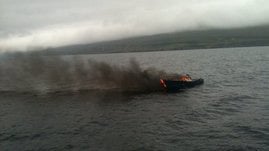
Photo: courtesy of Castletownbere lifeboat
A Coast Guard helicopter spotted the men in the water. The boat was on fire and sinking as they arrived.
The bodies of the three victims have been removed to hospital. It is understood all four men, who were in their 60s, were living in the Glengarriff area.
One of the victims is Irish and the other two men are from other European countries. A fourth man, who survived the incident, has also been taken to hospital.
The boat sank a short while later off Roancarrig, about seven miles from the fishing port. Conditions were calm at the time with some light fog in the bay, the spokeswoman said. Officials from the Marine Casualty Investigation Board will carry out an inquiry into the incident.
It is understood investigations will centre on whether an explosion in the engine caused the fire.
Press Release from RNLI:
Lifeboat crew with Castletownbere RNLI responded to a callout out this evening (Monday 16 August 2010) to a 25-foot cruiser on fire seven miles off the coast of Castletownbere, off Adrigole Harbour in Bantry Bay. The Shannon based Coast Guard helicopter was on scene and recovered four casualties from the water. Three were pronounced dead and one was taken to Cork University hospital for treatment.The Castletownbere all weather lifeboat was requested to launch at 17.41 hrs in calm conditions. On arrival at the scene the lifeboat volunteers witnessed the vessel on fire and the CG helicopter was recovering the casualties from the water. The Shannon based helicopter had been out on a callout and was in the area. The lifeboat was designated on scene commander and stayed on scene until the burning cruiser sank.



























